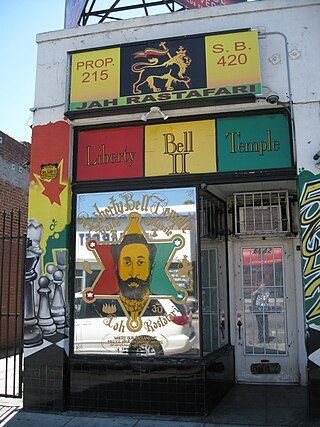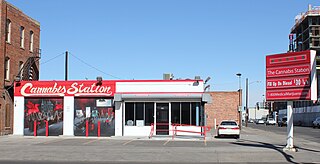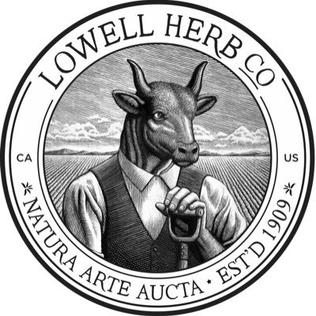
Proposition 215, or the Compassionate Use Act of 1996, is a California law permitting the use of medical cannabis despite marijuana's lack of the normal Food and Drug Administration testing for safety and efficacy. It was enacted, on November 5, 1996, by means of the initiative process, and passed with 5,382,915 (55.6%) votes in favor and 4,301,960 (44.4%) against.
Roger Christie is an American ordained minister in the Religion of Jesus Church, which regards marijuana as a "sacramental herb." In 2000, he founded the THC Ministry, which offered cannabis as a part of its services. On July 8, 2010, Christie and 13 other individuals associated with the THC Ministry were indicted by a Federal grand jury in Honolulu on marijuana possession and trafficking charges. On Sept. 27, 2013, Christie pleaded guilty to marijuana trafficking and two counts of failing to file income tax returns. On April 28, 2014, Christie was sentenced to a term of five years in federal prison, with credit for time already served at the Honolulu Federal Detention Center.

Different religions have varying stances on the use of cannabis, historically and presently. In ancient history some religions used cannabis as an entheogen, particularly in the Indian subcontinent where the tradition continues on a more limited basis.

Dana Albert Larsen is a Canadian author, businessman, philanthropist and activist for cannabis and drug policy reform. Larsen currently operates businesses and non-profit societies in Vancouver including The Medicinal Cannabis Dispensary, The Medicinal Mushroom Dispensary, The Coca Leaf Cafe, Pothead Books, and the Get Your Drugs Tested centre.

Cannabis in Oregon is legal for both medical and recreational use. In recent decades, the U.S. state of Oregon has had a number of legislative, legal, and cultural events surrounding use of cannabis. Oregon was the first state to decriminalize the possession of small amounts of cannabis, and among the first to authorize its use for medical purposes. An attempt to recriminalize possession of small amounts of cannabis was turned down by Oregon voters in 1997.

Cannabis in California has been legal for medical use since 1996, and for recreational use since late 2016. The state of California has been at the forefront of efforts to liberalize cannabis laws in the United States, beginning in 1972 with the nation's first ballot initiative attempting to legalize cannabis. Although it was unsuccessful, California would later become the first state to legalize medical cannabis through the Compassionate Use Act of 1996, which passed with 56% voter approval. In November 2016, California voters approved the Adult Use of Marijuana Act with 57% of the vote, which legalized the recreational use of cannabis.

Cannabis in Massachusetts is legal for medical and recreational use. It also relates to the legal and cultural events surrounding the use of cannabis. A century after becoming the first U.S. state to criminalize recreational cannabis, Massachusetts voters elected to legalize it in 2016.

Wikileaf Technologies is a Seattle business providing data services to the cannabis industry and information to consumers. The company provides price indexes and cannabis strain reviews and information.

Cannabis dispensaries in the United States or marijuana dispensaries are a local government regulated physical location, typically inside a retail storefront or office building, in which a person can purchase cannabis and cannabis related items for medical or recreational use. First modeled in Amsterdam in the late 1970s where they were innocently called coffee shops, it would take the Americans more than a generation to successfully duplicate the idea of a retail cannabis storefront. Unlike in the Dutch coffee shops, today dispensary customers are prevented from consuming cannabis on the site of a regulated dispensary in all known markets.

A cannabis shop, cannabis dispensary, or cannabis cooperative, is a location at which cannabis is sold for recreational or medical use. In the Netherlands these are called coffeeshops. In the United States they exist as an outlet for both recreational and medical use. These shops differ from head shops in that the latter sells only drug paraphernalia. In 2015, the City of San Diego made A Green Alternative the first licensed medical cannabis dispensary and delivery service in the city. The world's largest cannabis dispensary is in Las Vegas, Nevada at 112,000 square feet opened by Planet 13 Holdings.
Harborside, formerly Harborside Health Center, is a recreational and medical cannabis dispensary, with its flagship location in Oakland, California, and an additional location in San Jose. Founded in 2006 by longtime activist and entrepreneur, Steve DeAngelo and dress wedding, Harborside operates as a non-profit patient collective. In December 2011, Harborside Health Center was featured in the Discovery Channel's four-part documentary series, Weed Wars. In June 2013 CNN premiered "Inside Man", an 8-episode documentary hosted and produced by Morgan Spurlock. The show's first episode provided a detailed, inside look at California's medical marijuana industry and featured Spurlock working in Harborside Health Center, as well as it described the legal troubles of the center.

The Florida Medical Marijuana Legalization Initiative, also known as Amendment 2, was approved by voters in the Tuesday, November 8, 2016, general election in the State of Florida. The bill required a super-majority vote to pass, with at least 60% of voters voting for support of a state constitutional amendment. Florida already had a medical marijuana law in place, but only for those who are terminally ill and with less than a year left to live. The goal of Amendment 2 is to alleviate those suffering from these medical conditions: cancer, epilepsy, glaucoma, positive status for human immunodeficiency virus (HIV), acquired immune deficiency syndrome (AIDS), post-traumatic stress disorder (PTSD), amyotrophic lateral sclerosis (ALS), Crohn's disease, Parkinson's disease, multiple sclerosis, chronic nonmalignant pain caused by a qualifying medical condition or that originates from a qualified medical condition or other debilitating medical conditions comparable to those listed. Under Amendment 2, the medical marijuana will be given to the patient if the physician believes that the medical use of marijuana would likely outweigh the potential health risks for a patient. Smoking the medication was not allowed under a statute passed by the Florida State Legislature, however this ban was struck down by Leon County Circuit Court Judge Karen Gievers on May 25, 2018.

Cannabis has served as an entheogen—a chemical substance used in religious or spiritual contexts—in the Indian subcontinent since the Vedic period dating back to approximately 1500 BCE, but perhaps as far back as 2000 BCE. It was introduced to the New World by the Spaniards in 1530-1545. Cannabis has been used by shamanic and pagan cultures to ponder deeply religious and philosophical subjects related to their tribe or society, to achieve a form of enlightenment, to unravel unknown facts and realms of the human mind and subconscious, and also as an aphrodisiac during rituals or orgies. There are several references in Greek mythology to a powerful drug that eliminated anguish and sorrow. Herodotus wrote about early ceremonial practices by the Scythians, thought to have occurred from the 5th to 2nd century BCE. Itinerant Hindu saints have used it in the Indian subcontinent for centuries. Mexican-Indian communities occasionally use cannabis in religious ceremonies by leaving bundles of it on church altars to be consumed by the attendees.

Terms related to cannabis include:

Eaze is an American company based in San Francisco, California that launched a medical cannabis delivery app of the same name in 2014.

The International Church of Cannabis is a religious organization in Denver that uses cannabis as a sacrament. Members claim the use of cannabis helps elevate people to a higher understanding of self.

Lowell Herb Co is a California-based cannabis brand owned by Lowell Farms that sells packs of pre-rolled joints in varying blends, including seasonal crops.
Ed Forchion, also known as NJWeedman, is an American Rastafari cannabis rights and free speech activist, perennial candidate, actor, writer, and restaurateur. He is the founder of the Legalize Marijuana Party.
The Barbary Coast Collective lounge on Mission Street in San Francisco, California is the first Amsterdam-style coffee shop allowing on-premises cannabis consumption for any adult in California since January 2018. It is perhaps the first in the United States. Its interior "resembles a steakhouse or upscale sports tavern with its red leather seats, deep booths with high dividers, and hardwood floors". Its owners include David Ho, described as a "political power player in Chinatown". In opening another Barbary Coast Collective establishment, the first dispensary in the Sunset District, Ho had to negotiate with fellow Chinese-American citizens of the district who were opposed to cannabis businesses and cannabis advertising.

The COVID-19 pandemic had a significant impact on the cannabis industry. Investor's Business Daily said the industry was affected as "customers stock up on prescriptions and recreational customers load up on something to make the lockdown a little more mellow or a little less boring".


















